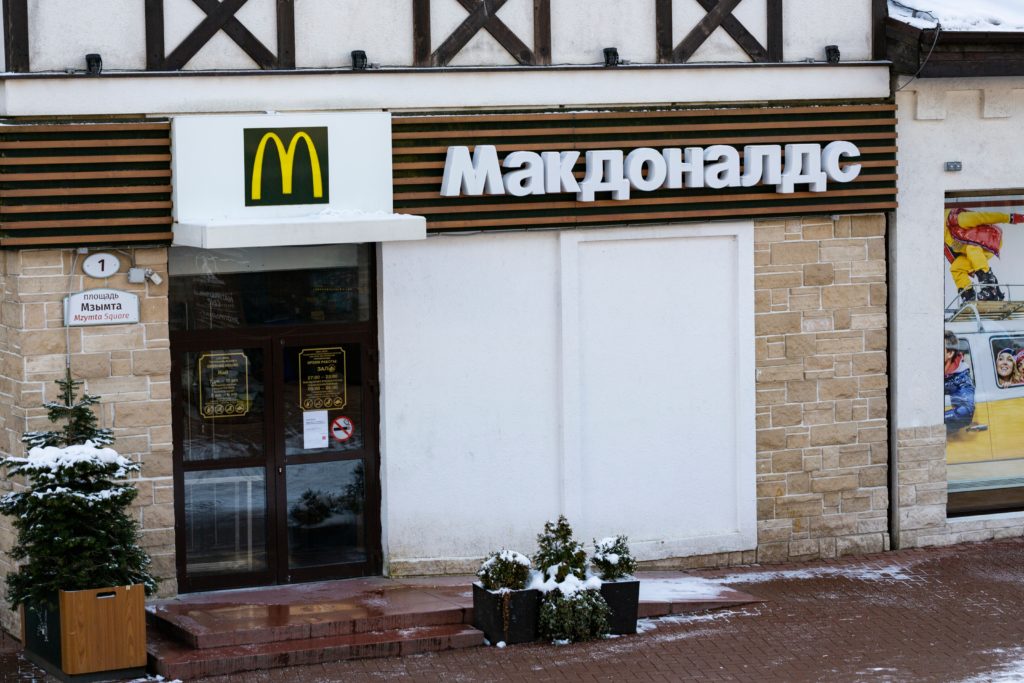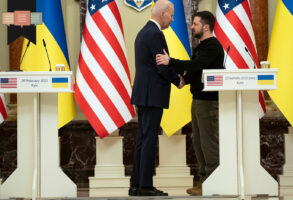
Published March 29, 2022
First came the official sanctions, long warned of by Western governments but surprising to many in their speed and forcefulness. Bans on Russian imports, freezes on Russian financial assets, and the isolation of the Russian banking system, all came within days of Russia’s invasion of Ukraine. But then, rather less expected, came a growing tsunami of unofficial sanctions, as company after company sought to wash its hands of any connection to the Russian economy or society. Some were potentially crippling: Visa and Mastercard’s suspension of all credit card services, for instance. Others were perhaps mere virtue signaling, such as McDonalds’s announcement that henceforth it would stop selling hamburgers in Russia but keep paying its Russian employees—in other words, subsidize the Russian economy. Some were downright farcical, such as the decision by some leading orchestras to stop performing music by Tchaikovsky.
Those who view the response to the war in Ukraine through the moralistic lens of a playground bully finally getting his just comeuppance might be content to cheer every fresh pile on. After all, Russian President Vladimir Putin is just that sort of bully. But there is something rather odd and unsettling about this corporate cancellation of an entire nation. Historically, private businesses have usually insisted on trying to maintain business as usual in wartime, even when governments tried to stop them. During the Napoleonic wars, for instance, U.S. merchants stubbornly continued their trade with France and Britain despite various attempts by the U.S. government to impose embargoes. Today, though, the private sector is galloping out ahead of the U.S. State Department. This trend should trouble us for two reasons.
First, whereas the actions taken by U.S. and European governments reflect (one hopes!) careful weighing of diplomatic, military, and economic factors to achieve policy objectives, those taken by corporate giants seem reminiscent instead of the mass mania of cancel culture. A behemoth like Royal Dutch Shell, which over the years has weathered storms of controversy over climate change and human-rights violations, was forced into abject apologies for daring to purchase a shipment of oil from Russia. Influencers on Twitter demanded a boycott of Coca-Cola for daring to continue supplying the Russian people with its caramel-colored corn syrup. The corporate crackdown on Russia seems less an effort to dethrone Putin or save Ukraine and more of a way to satisfy the manic morality of guilt by association that won’t allow Delta Air Lines to stay out of controversies over Georgia’s voting laws.
Click here to read the rest of this piece at WORLD Opinions.
Brad Littlejohn (Ph.D., University of Edinburgh) is the founder and president of the Davenant Institute. He also works as a fellow at the Ethics and Public Policy Center and has taught for several institutions, including Moody Bible Institute–Spokane, Bethlehem College and Seminary, and Patrick Henry College. He is recognized as a leading scholar of the English theologian Richard Hooker and has published and lectured extensively in the fields of Reformation history, Christian ethics, and political theology. He lives in Landrum, S.C., with his wife, Rachel, and four children.
Brad Littlejohn, Ph.D., is a Fellow in EPPC’s Evangelicals in Civic Life Program, where his work focuses on helping public leaders understand the intellectual and historical foundations of our current breakdown of public trust, social cohesion, and sound governance. His research investigates shifting understandings of the nature of freedom and authority, and how a more full-orbed conception of freedom, rooted in the Christian tradition, can inform policy that respects both the dignity of the individual and the urgency of the common good. He also serves as President of the Davenant Institute.










